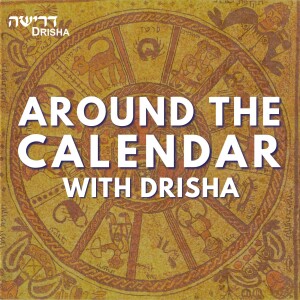Around the Calendar with Drisha
Over the years, Drisha has offered Torah classes on the many observances that mark out the timeline of the Jewish yearly cycle. Around the Calendar brings you all our holiday- and observance-focused classes, from our back catalog of recordings and continuing through our contemporary shiurim and lectures.
Episodes

Monday May 19, 2025
Monday May 19, 2025
In this course, we will explore the Yom Kippur service of the Kohen Gadol, a significant but sometimes enigmatic aspect of the liturgy. By delving into the significance and symbolism behind key elements of the service, we will confront many of the fundamental questions of Yom Kippur, such as whether atonement can happen without repentance, the influence of fate and destiny, and the profound impact an individual’s actions can have on the community.

Monday May 19, 2025
Monday May 19, 2025
In his book The Prophets (1962), Abraham Joshua Heschel sought to resurrect before us the prophetic experience. In this lesson we will read his commentary on the book of Jeremiah in order to meet the prophet who cries at the destruction of Jerusalem. For him, it was not just a national or religious destruction; he cried out for God's pain.

Friday Dec 15, 2023
Friday Dec 15, 2023
More than any other holiday, Hanukkah is all about the home. The Jewish people, with our long history of exile and displacement, has a complicated relationship with the space and rootedness we associate with "home." Our study of the laws of Hanukkah candle lighting will shed some light on a uniquely Jewish vision of homemaking.

Friday Dec 15, 2023
Friday Dec 15, 2023
More than any other holiday, Hanukkah is all about the home. The Jewish people, with our long history of exile and displacement, has a complicated relationship with the space and rootedness we associate with "home." Our study of the laws of Hanukkah candle lighting will shed some light on a uniquely Jewish vision of homemaking.

Friday Dec 15, 2023
Friday Dec 15, 2023
More than any other holiday, Hanukkah is all about the home. The Jewish people, with our long history of exile and displacement, has a complicated relationship with the space and rootedness we associate with "home." Our study of the laws of Hanukkah candle lighting will shed some light on a uniquely Jewish vision of homemaking.

Friday Dec 15, 2023
Friday Dec 15, 2023
Often in Elul, Sukkot is forgotten. We focus on the High Holidays but forget that Sukkot comes immediately after. There are several unique rules that characterize the laws of Sukkot, such as mere discomfort exempting one from living in the Sukkah and the heightened requirements for beauty in the Arba Minim. We will explore whether these laws are unique to Sukkot or act as paradigms of broader Torah values.

Friday Dec 15, 2023
Friday Dec 15, 2023
Often in Elul, Sukkot is forgotten. We focus on the High Holidays but forget that Sukkot comes immediately after. There are several unique rules that characterize the laws of Sukkot, such as mere discomfort exempting one from living in the Sukkah and the heightened requirements for beauty in the Arba Minim. We will explore whether these laws are unique to Sukkot or act as paradigms of broader Torah values.

Friday Dec 15, 2023
Friday Dec 15, 2023
In this course, we will explore the Yom Kippur service of the Kohen Gadol, a significant but sometimes enigmatic aspect of the liturgy. By delving into the significance and symbolism behind key elements of the service, we will confront many of the fundamental questions of Yom Kippur, such as whether atonement can happen without repentance, the influence of fate and destiny, and the profound impact an individual’s actions can have on the community.

Friday Dec 15, 2023
Friday Dec 15, 2023
Session 2: Open the Gates
Rosh HaShanah, through Yom Kippur, are viewed as a time when the Gates of Rahamim, Mercy, are particularly receptive - an Et shaareh ratson. We will look at several central piyytim that develop this theme, and that introduce the Shofar and prayers of the day.

Friday Dec 15, 2023
Friday Dec 15, 2023
How can we know what God wants of us? In Genesis 16, Sarai, Avram, and Hagar all struggle to understand their roles in God's covenant. Their interactions and their mistakes lay the groundwork for Genesis 21, the powerful Torah reading of the first day of Rosh haShannah. We will do a close reading of both of these biblical texts and utilize rabbinic midrashim to explore each character's motivation and why this story was chosen to be read on the Day of Judgment.







